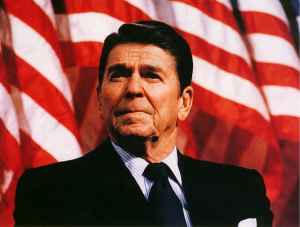- MENU
- HOME
- SEARCH
- WORLD
- MAIN
- AFRICA
- ASIA
- BALKANS
- EUROPE
- LATIN AMERICA
- MIDDLE EAST
- United Kingdom
- United States
- Argentina
- Australia
- Austria
- Benelux
- Brazil
- Canada
- China
- France
- Germany
- Greece
- Hungary
- India
- Indonesia
- Ireland
- Israel
- Italy
- Japan
- Korea
- Mexico
- New Zealand
- Pakistan
- Philippines
- Poland
- Russia
- South Africa
- Spain
- Taiwan
- Turkey
- USA
- BUSINESS
- WEALTH
- STOCKS
- TECH
- HEALTH
- LIFESTYLE
- ENTERTAINMENT
- SPORTS
- RSS
- iHaveNet.com: Politics
by Jules Witcover

Ronald Reagan
Ever since Ronald Reagan left the
The first major indication of the crumbling empire came less than ten months after Reagan departed office with the fall of the Berlin Wall on November 9, 1989. That was roughly 18 months after Reagan went to the Brandenburg Gate and demanded that Soviet leader Mikhail Gorbachev "tear down this wall."
Reaganites point to the event in claiming their hero's buildup of American defenses, and particularly his pursuit of a costly missile defense system, ultimately bankrupted the Soviet Union in its efforts to keep pace. But critics and many Russian scholars say the regime eventually collapsed of its own economic and ideological unsustainability.
Author James Mann, who in his excellent book "Rise Of The Vulcans: The History of Bush's War Cabinet"
first alerted readers to the George W. Bush embrace of
neo-conservatism that produced his invasion of
Iraq, has now turned his informed eye to Reagan as
the supposed architect of the Soviet fall.
In "The Rebellion of Ronald Reagan: A History of the End of the Cold War,"
Mann makes a persuasive case that the man once disparaged as "an amiable dunce" by Democratic wise man Clark
Clifford actually did have a part, intentionally or otherwise, in that great Soviet disintegration. .
Mann argues that Reagan, for all his casual and supposedly malleable persona, did perceive Gorbachev's recognition of his own country's internal weakness and corruption, and his attempts to set it on a more conciliatory path toward the West, the United States particularly.
Despite Reagan's first-term belligerent talk of "evil empire," Mann notes, upon meeting Gorbachev in Geneva in 1985 and at Reykjavik a year later he saw in him the beginnings of a serious quest toward nuclear arms control. It was dismissed at the time, Mann says, by Richard Nixon, with whom Reagan met secretly, and Henry Kissinger.
At the same time, he writes, Reagan was "horrified by the possibility of nuclear war," and that "doomsday exercises of the early 1980s" that Mann uncovered "may have scared Reagan into trying to change American policy" in his second term, prodding "military and defense officials to accept cutbacks in nuclear weapons and ballistic weapons."
Ronald Reagan comes through as a conservative leader who, behind his combative rhetoric and advisers frozen in Cold War thinking, saw and encouraged the possibilities for lowering the temperature in Gorbachev's policies toward the Soviet satellite states, and in his personal contacts with the man.
Days after the
Mann writes that although Reagan's first-term aggressiveness may have had "a long-term effect on the Soviet economy that might have eventually led to the country's disintegration ... there is little evidence that the American actions brought down the Soviet regime."
The Soviet economy, he writes, "was foundering because of deep-seated and chronic problems that had nothing to do with the Reagan administration's policies. Although the Soviet system was in decline, it was not headed toward a collapse, and Reagan's first-term policies, including the defense buildup and the covert-action programs, did not cause the collapse."
Rather, Mann writes, "the proximate cause ... was Gorbachev himself,"
in his decision "not to intervene in Eastern Europe
in 1989" and in his "partially democratized" domestic reforms that
nevertheless left the
Still, he says: "Reagan's willingness to do business with Gorbachev gave the Soviet leader the time and space he needed to demolish the Soviet system. ... Gorbachev existentially destroyed the Soviet system. Reagan gave him the help he needed to do it."
That conclusion alone, however, casts Clark Clifford's "amiable dunce" in a considerably more favorable light for history's judgment.
Available at Amazon.com:
Rise Of The Vulcans: The History of Bush's War Cabinet
The Rebellion of Ronald Reagan: A History of the End of the Cold War
AMERICAN POLITICS
WORLD | AFRICA | ASIA | EUROPE | LATIN AMERICA | MIDDLE EAST | UNITED STATES | ECONOMICS | EDUCATION | ENVIRONMENT | FOREIGN POLICY | POLITICS
Receive our political analysis by email by subscribing here
New View of Ronald Reagan and End of the Cold War | Jules Witcover
© Tribune Media Services